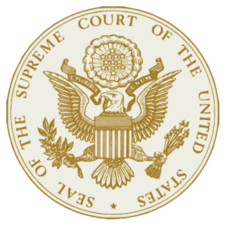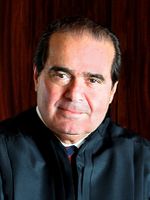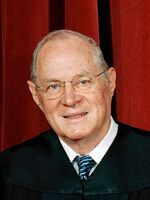Burwell v. Hobby Lobby Stores, Inc.
 | |
| Burwell v. Hobby Lobby Stores, Inc. | |
| Docket number: 13-354 | |
| Court: United States Supreme Court | |
| Court membership | |
| Chief Justice John G. Roberts Associate Justices Antonin Scalia Anthony Kennedy • Clarence Thomas Ruth Bader Ginsburg • Steven G. Breyer Samuel Alito • Sonia Sotomayor • Elena Kagan | |
Burwell v. Hobby Lobby Stores, Inc. was a United States Supreme Court case regarding the Affordable Care Act's contraception mandate. At issue was whether the law's requirement that health plans provide women cost-free access to contraceptives violated the Religious Freedom Restoration Act for closely held corporations run on religious principles.
The court limited oral arguments to the following question:
|
In a 5-4 decision issued June 29, 2014, the court ruled that the contraception mandate placed a substantial burden on religious corporations and was not the least restrictive method of fulfilling the government's interest in providing free contraceptive coverage to women.
Background
The Patient Protection and Affordable Care Act, also known as the Affordable Care Act or Obamacare, mandated that insurance plans must cover preventive healthcare—which the U.S. Department of Health and Human Services later interpreted to include contraception—at no cost. Employers that didn't provide this benefit in their health insurance plan would face fines. Religious organizations argued that being required to cover birth control violated religious freedoms. Religious employers and nonprofits were exempted from the requirement, but religious for-profit corporations were not.[2]
Hobby Lobby, a company that describes itself as "operating ... in a manner consistent with Biblical principles," sued the secretary of health and human services, Kathleen Sebelius, on September 12, 2012. The company sought exemptions from coverage of four different contraceptives—two emergency morning-after pills and two intrauterine devices (IUDs)—on the basis that those contraceptives violated their religious beliefs. The company did not argue against providing other forms of contraception.[3][4][5]
The district court denied the company's request for a preliminary injunction against enforcement of the mandate, a judgment that was affirmed upon review by a two-judge panel of the Tenth Circuit Court of Appeals. The Supreme Court also denied the request, at which point Hobby Lobby requested—and was granted—a hearing by the full Tenth Circuit Court. The Tenth Circuit reversed the opinion of the two-judge panel and ruled in favor of Hobby Lobby, holding that closely held religious corporations were protected by both the Religious Freedom Restoration Act and the First Amendment of the United States Constitution.[2]
Similarly, Conestoga Wood Specialties was a company owned by a Mennonite family who objected to contraceptives that could potentially cause an abortion. In July 2013, the Third Circuit Court of Appeals ruled against Conestoga Wood Specialties on the grounds that for-profit corporations cannot engage in religious exercise.[6]
To resolve the discrepancy, the Supreme Court granted certiorari on November 25, 2013, and oral arguments were heard on March 24, 2014.[2]
Decision
|
|
|
|
|
|
In a 5-4 decision issued June 29, 2014, the Supreme Court ruled in favor of Hobby Lobby in Burwell v. Hobby Lobby. The decision of the Tenth Circuit was affirmed, and the decision of the Third Circuit was reversed and remanded. The majority opinion was written by Justice Samuel Alito, who was joined by Chief Justice John Roberts and Justices Antonin Scalia, Anthony Kennedy, and Clarence Thomas.[2][7]
The court found that the contraception mandate imposed a significant burden on religious corporations and that it was not the least restrictive means of fulfilling the government's objective of providing women access to free birth control. The court noted that a less restrictive method already existed in the exemption provided to religious nonprofits and that the same exemption should be provided to closely held religious corporations.[2]
The case hinged on the free exercise clause of the First Amendment and the Religious Freedom Restoration Act (RFRA) passed by Congress in 1993. RFRA stated that the federal government "shall not substantially burden a person’s exercise of religion even if the burden results from a rule of general applicability." Justice Samuel Alito, writing the court's opinion, turned to Title 1 of the United States Code (the "dictionary" used in interpreting statutes) to interpret the word person. Since Title 1 of the code defined person to include "corporations, companies, associations, firms, partnerships, societies, and joint stock companies, as well as individuals," the court found that for-profit corporations qualified as persons for the purposes of RFRA. The opinion concluded, "We doubt that the Congress that enacted RFRA—or, for that matter, ACA—would have believed it a tolerable result to put family-run businesses to the choice of violating their sincerely held religious beliefs or making all of their employees lose their existing healthcare plans."[8][9][10]
In the court's opinion, Justice Alito carefully crafted his words to emphasize the fact that this decision was narrow and applied only to the women's contraceptive coverage mandate of the Affordable Care Act.[7]
Dissent
|
|
|
|
|
The dissent was written by Justice Ruth Bader Ginsburg, who was joined by Justices Sonia Sotomayor, Stephen Breyer, and Elena Kagan. Justices Breyer and Kagan together filed a separate dissent. Justice Ginsburg's dissent was an impassioned one, and in it she called the majority's decision one of "startling breadth." The dissenting justices claimed the ruling would allow companies to "opt out of any law (saving only tax laws) they judge incompatible with their sincerely held religious beliefs." Likewise, the Obama administration argued that companies that did not wish to provide the contraceptive coverage or other areas of coverage due to religious beliefs could decide not to provide any company-wide options.[8]
Significance
Though this decision expanded the notion of corporate personhood to include religious rights "to provide protection for human beings," members of the public found it highly divisive in nature as it reaffirmed the court's "pro-business" stance. Democratic politicians like Senate Majority Leader Harry Reid pledged to restore the Affordable Care Act's contraception coverage:[11][12]
| “ | If the Supreme Court will not protect women's access to health care, then Democrats will. We will continue to fight to preserve women’s access to contraceptive coverage and keep bosses out of the examination room.[13] | ” |
Republican House Speaker John Boehner, however, was optimistic about the court's decision, calling it a "victory for religious freedom."[14]
See also
External links
- Supreme Court of the United States, "Burwell v. Hobby Lobby" (text of opinion)
- Oyez, "Burwell v. Hobby Lobby Stores"
- SCOTUSblog coverage of Burwell v. Hobby Lobby Stores, Inc.
- Justia, "Burwell v. Hobby Lobby Stores, Inc."
- The Hobby Lobby Case
Footnotes
- ↑ Supreme Court of the United States, "Burwell v. Hobby Lobby Stores, Inc.," accessed May 21, 2016
- ↑ 2.0 2.1 2.2 2.3 2.4 Oyez, "Burwell v. Hobby Lobby Stores," accessed May 21, 2016
- ↑ Christian-Science Monitor, "Hobby Lobby 101: explaining the Supreme Court's birth control ruling," July 10, 2014
- ↑ The Hobby Lobby Case, "Case Timeline," accessed May 21, 2016
- ↑ Hobby Lobby, "About Us," accessed October 6, 2017
- ↑ Lancaster Online, "Conestoga Wood Specialties Loses Healthcare Law Challenge in Federal Court," July 26, 2013
- ↑ 7.0 7.1 Supreme Court of the United States, "Burwell v. Hobby Lobby," accessed May 21, 2016
- ↑ 8.0 8.1 Politico, "Supreme Court sides with Hobby Lobby on contraception mandate," June 30, 2014
- ↑ SCOTUSblog, "Symposium: Why is RFRA still valid against the federal government?" February 20, 2014
- ↑ Legal Information Institute, "42 U.S. Code § 2000bb–1 - Free exercise of religion protected," accessed May 21, 2016
- ↑ Reuters, "U.S. birth control ruling fuels battle over corporate rights," July 1, 2014
- ↑ Politico, "SCOTUS sides with Hobby Lobby on birth control," June 30, 2014
- ↑ Note: This text is quoted verbatim from the original source. Any inconsistencies are attributable to the original source.
- ↑ Speaker.gov, "Press Release: Speaker Boehner on the Supreme Court’s HHS Mandate Ruling," June 30, 2014













